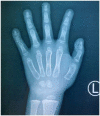Floating-Harbor Syndrome Treated With Recombinant Human Growth Hormone: A Case Report and Literature Review
- PMID: 34805044
- PMCID: PMC8602871
- DOI: 10.3389/fped.2021.747353
Floating-Harbor Syndrome Treated With Recombinant Human Growth Hormone: A Case Report and Literature Review
Abstract
Introduction: We aimed to summarize the clinical characteristics of Floating-Harbor syndrome (FHS) and the effect of recombinant human growth hormone (rhGH) to increase height. Methods: The clinical manifestations, gene sequencing results, treatment, and regression of one child with FHS were reported at the Department of Pediatrics, General Hospital of Tianjin Medical University, in July 2020. PubMed was searched using the keyword "Floating-Harbor Syndrome" up to March 2021 to obtain clinical information on children with FHS for review. Results: The child, who was a male aged 6 years and 9 months, presented to the clinic with main complaints of delayed language development since childhood and a short stature for 4 years. The child's short stature, peculiar facial features, delayed language development, and delayed bone development were considered alongside genetic testing and Sanger sequencing to verify the results. A heterozygous mutation (c.7401delC; p.Ile2468Phefs*7) was identified in exon 34 of the SRCAP gene, which was a frameshift mutation, and Sanger verification showed that neither parent had this mutation. The child was administered subcutaneous injection of rhGH (0.13 U/kg/day) and was followed up regularly. At the time of writing, the child had been treated for 6 months and was 7 years and 3 months old with a height of 106.3 cm (-3.69 SDS), which was a height increase of 6.3 cm. The patient did not complain of discomfort during treatment and presented normal laboratory tests results. Twenty-two children with FHS treated with rhGH were included in the literature review, and most of these patients demonstrated an increase in height SDS without adverse effects. Conclusion: Short stature, delayed skeletal maturation, impaired language expression, intellectual deficits, and peculiar facial features are the main clinical features of FHS. rhGH can be used as a treatment to increase height in patients with FHS, but its effectiveness and safety still need to be monitored in larger sample sizes over longer periods of time.
Keywords: Floating-Harbor syndrome; SRCAP gene; recombinant human growth hormone; short stature; treatment.
Copyright © 2021 Bo, Jiang, Zheng and Sun.
Conflict of interest statement
The authors declare that the research was conducted in the absence of any commercial or financial relationships that could be construed as a potential conflict of interest.
Figures


References
LinkOut - more resources
Full Text Sources

